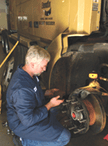With the exception of requirements for automatic slack adjusters and antilock braking systems enacted in the 1990s, Federal Motor Vehicle Safety Standards (FMVSS) governing heavy-duty truck braking system performance have remained virtually unchanged for many years. That status quo, however, is now being challenged by a National Highway Traffic Safety Administration (NHTSA) December 2005 Notice of Proposed Rulemaking (NPRM) calling for a 20 percent to 30 percent reduction in the required stopping distance for large trucks. The agency is reviewing industry comments about its proposal and a new rule could take effect as early as 2008.
The impetus behind the NPRM on truck stopping distances is the Motor Carrier Safety Improvement Act of 1999, which was designed to reduce highway fatalities by 50 percent over the following 10-year period. NHTSA believes it can achieve this goal by reducing the tractor stopping distance requirement. Among its findings are that the difference in stopping distances between large trucks and passenger vehicles are a leading factor in the intensity of highway accidents. Currently, FMVSS provisions set the stopping distance for heavy trucks at 355 feet and at 216 feet for passenger vehicles. A 30 percent reduction would lower the heavy truck threshold to 249 feet.
Technological advances
If new stopping distance requirements for new vehicles are mandated, the rule will only affect tractors initially, although ongoing research by NHTSA may impact future stopping distance requirements for all air braked vehicles, including trailers, trucks and buses. In addition, NHTSA said it believes that braking system technology has advanced to the point that shorter stopping distances for tractors are feasible. “We believe that due to recent technological advances in heavy-duty vehicle brakes,” an agency research report said, “required stopping distances for these vehicles can be made substantially shorter.”

Bendix Spicer Foundation Brake LLC, the new foundation brake joint venture between Bendix Commercial Vehicle Systems LLC and Dana Corp., maintains that for the sake of highway safety the maximum effort should be made to shorten the stopping distance for tractors.
“This reduction will bring trucks more in line with passenger cars,” the company says. “The incremental benefit in terms of lives saved, accidents prevented and property damage lost is significantly greater than the cost of implementing a 30 percent reduction.”
ArvinMeritor’s Commercial Vehicle Systems business also supports the intent of the NHTSA proposal to implement vehicle braking system improvements that will reduce stopping distances by 20 percent to 30 percent. “We will support industry-wide efforts to meet these new requirements,” says Paul Johnston, senior director, North American Foundation Brake Business. “ArvinMeritor also agrees with the finding that truck-tractor vehicles represent the largest opportunity to reduce stopping distances.”
Impacting specifications
Improving the stopping distance performance of tractors could have a significant impact on future braking system specification choices for fleets. “Depending on the percent reduction in the final rule, the stopping distance could be achieved by increasing the brake torque on just the steer axle,” Johnston says. “Larger front drum brakes or air disc brakes could accomplish the requirement for many typical vehicle combinations. We expect to see changes in the front axle steering and suspension as well as ABS in order to implement either drum or disc brake solutions to meet more aggressive stopping distance reductions.”
Extensive vehicle test data from Bendix Spicer Foundation Brake and other sources confirms that a variety of foundation brake configurations, including all-drum brakes, all-disc brakes or a combination of both, can meet or exceed a 30 percent reduction requirement. In fact, the company said all-disc truck tractors have consistently shown the ability to stop within today’s regulatory standard for passenger cars.
Bendix Spicer products available today to meet the proposed stopping distance reduction include foundation brakes that accommodate larger drum brakes or disc brakes and ensure a proper fit within existing wheel-ends., the company said.
“Fleets will need to weigh a variety of factors, including up-front cost, maintenance intervals, replacement parts, driver retention and vehicle applications, and will have different philosophies as to how they’re going to spec new tractors to adhere to the regulation,” the company says. “The key is that NHTSA is not advocating a specific technology and that fleets will be able to make brake specification decisions based on their own needs and preferences.”
Meritor WABCO Vehicle Control Systems also is prepared to help fleets make the best specification decisions for brakes with its commercial vehicle brake products portfolio and the addition of air disc brakes. The joint venture between ArvinMeritor and WABCO offers air disc brakes for a broad range of heavy-duty vehicles and will offer the Meritor EX225 air disc brake family for severe service applications.
“Fleets will have access to a comprehensive selection of the latest technology in braking systems for heavy-duty trucks,” says Jon Morrison, general manager of Meritor WABCO. “This bolsters the ability to prepare for shorter stopping distance regulations. In particular, air disc brakes have been gaining strength in specialty applications and we expect their use to grow gradually in linehaul operations.”
At Bendix Spicer, North American production of the Bendix ADB22X air disk brake began in 2005. In addition, the company says in a paper on its technology initiatives for 2006, that the wide brake packages have become a standard specification for many fleets, and it anticipates the development and deployment of high-performance drum brake packages to meet the proposed stopping distance standards.
Prepared to help
Haldex Commercial Vehicle Systems also is prepared to help fleets meet new stopping distance standards with a range of products for installation on new vehicles. The manufacturer’s offerings include the ModulX air disc brake for heavy-duty applications.
Air disc brakes can offer fleets a new level of confidence because they are efficient and responsive, providing greater safety and control in demanding applications, Haldex says. In addition, they are less sensitive to speed and temperature variations and therefore exhibit less brake fade and require less pedal pressure. Better stability and significantly shorter stopping distances with air disc brakes on heavy-duty vehicles is an important safety benefit, the company says.
Today’s commercial braking systems are already called on to respond effectively and bring vehicles to a safe controlled stop in as short a distance as possible. With increasing traffic and roadway congestion, there is now a growing need to enhance braking performance, a factor that is being recognized by regulators in proposed reductions to heavy-duty vehicle stopping distances.
For the entire trucking industry, making roadways safer is always a key concern. Braking system suppliers are now helping achieve that goal by bringing new technology and specification choices to fleets.




